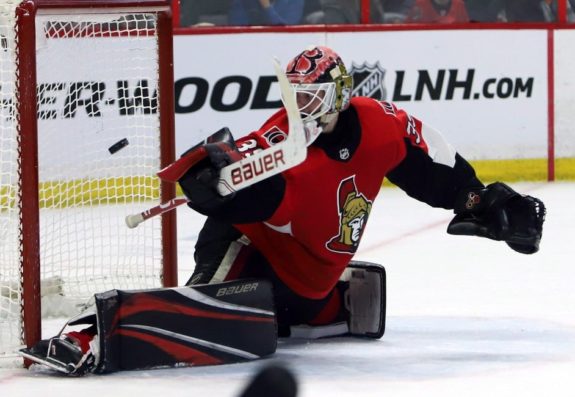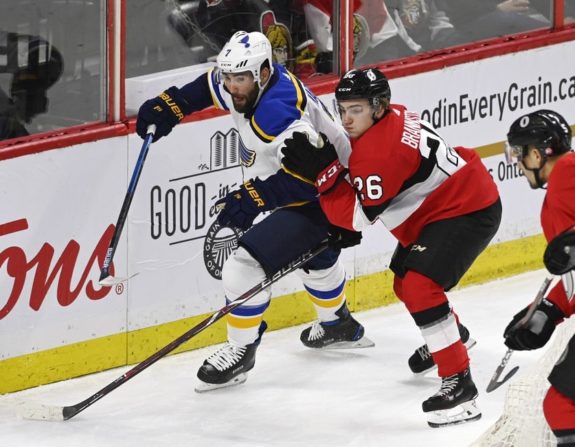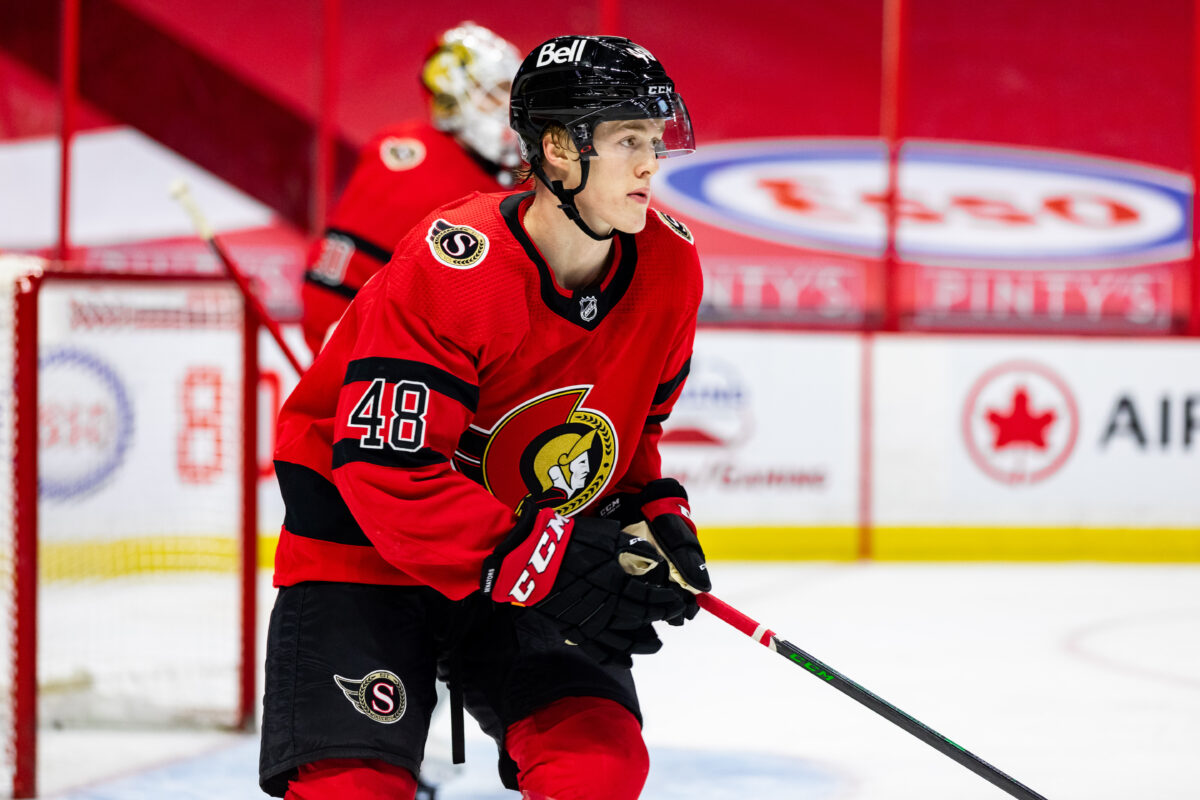The defensive core of the Ottawa Senators had a difficult start to the 2020-21 season. Lapses were frequent, and the goaltending carousel started early. When the defensive group was on the same wavelength, scoring seemed to be difficult to come by. However, the team really started to gel in the second half of the season and achieved some success, particularly through the last month. Defensive pairings were consistent and reliable, and although the goaltending was still a carousel, they were getting better performances in net, and the forwards were putting goals on the scoresheet.
The waves of the season were palpable and made for an interesting end-of-season review. For this list, I’ll assess the seasons of the defensemen and goaltenders who played at least 10 games (with some exceptions) and were not in their first season with the team.
Similar to the grading criteria for Ottawa’s newest Senators, I’ll look at the scoresheet and season statistics, but I’ll also consider whether they helped the team in the area of their expertise, added anything to their game, and added to the team’s potential going forward. An A means they likely exceeded expectations, a B means they met expectations, a C means they didn’t quite meet expectations, and anything below is not good.
Goaltenders: Marcus Högberg
Högberg came into the season as the designated backup goaltender for the Senators. When the season got off to a tough start, he had opportunities in net but couldn’t make the most of them. He let in five goals in each of his first three appearances, where he played more than one period. He was unable to help get a win until Feb. 13, five starts into his season. He suffered an injury five days later that kept him out of the Senators’ net until April 7.

With most of it lost to the injury, he had a difficult season, only winning four games and posting a 3.74 goals against average (GAA) and a team-worst .876 save percentage (SV%). With a few goalies with potential in the system, Högberg was not given a qualifying offer and will be playing elsewhere next season.
Grade: C
Joey Daccord
Daccord was the taxi squad goaltender to start the 2020-21 season for the Senators. He started one game in 2018-19 for the Senators, so he’s technically not new, even if he hasn’t really had a full rookie season. He also only appeared in eight games this season, but the goaltending was such a central narrative throughout that they all deserve individual reviews. Daccord was caught in a tough spot to begin. The AHL didn’t start at the same time as the NHL, so he wasn’t playing anywhere. He just dressed for practices and traveled with the team. He certainly learned about the daily lifestyle of an NHL player, but I’m sure he wanted to get into games to further his development.
That opportunity came at the end of February when he entered a game in relief in a game against the Calgary Flames and played one period, shutting the door against five shots. He made six more starts before suffering a season-ending injury, but he was able to get his first career win in the NHL against the Toronto Maple Leafs on March 14. In a season of tough stretches, particularly early on, this win was a moment of celebration for the team and fans. Daccord displayed stretches of confident play in this small sample, despite what the numbers say (.897 SV% and 3.27 GAA). He’ll likely start next season with the Belleville Senators, but he’ll be ready if the door opens again.
Grade: B
Filip Gustavsson
Gustavsson was another bright spot on the season and technically a new Ottawa Senator who played fewer than 10 games, but he was central to some of the strong play towards the end of the season and deserves acknowledgment. Thrust into action again because of injuries, he made his first appearance in the middle of the third period on March 17 and stopped all 8 shots from then on, including overtime. The Senators lost in a shootout that evening, but onlookers took note of Gustavsson’s strong presence. He continued to put up solid numbers when he entered the net, including a team-high .933 SV% for the season. He was also the only goaltender to post a sub 3.00 GAA on the season, and he did so impressively, finishing with a 2.16 GAA.
Through his nine appearances, he helped pull together five wins for the Senators and added one loss, one overtime loss, and what you might call a no-decision for goaltenders to borrow a baseball phrase. He’s the youngest of the group that started a game in net this season and displayed great strength and potential. Assuming he isn’t on the Seattle Kraken depth chart to start next season, he’ll likely get some games in for the Belleville Senators, but he’ll be hard to keep out of the net if Matt Murray or Anton Forsberg can’t find their game.
Grade: A-
Anton Forsberg
Forsberg was a late addition to the Senators’ roster this season and played fewer than 10 games, but his presence was significant (as it appears to be heading into next season), so he also deserves an acknowledgment in this end of season goaltending review discussion. He started eight games for the Sens, but he might have gotten into more games had the team been able to pick him up earlier. Forsberg was a traveling man in 2020-21. He was signed by the Edmonton Oilers in October 2020 and waived in January 2021, claimed by the Carolina Hurricanes off waivers on Jan. 12 and then waived again, claimed by the Winnipeg Jets off waivers, waived again, and then claimed by the Senators on March 17.
Perhaps he was the simplest option considering that he was already in Canada and wouldn’t be subject to the fullest quarantine rules, but after arriving in Ottawa, Forsberg played well enough across those eight starts to post the second-best GAA and SV% on the Senators this season at 3.21 and .909, respectively. There’s no questioning his dedication, and despite not wracking up the wins in his starts (three wins, four losses, and one overtime loss), the organization liked enough of what they saw to offer him an extension for next season. Forsberg should start the campaign with the backup spot in hand, but he’ll have Gustavsson and Daccord pushing for the role as he pushes Murray to bring his best.
Grade: B+
Defenseman: Thomas Chabot
Chabot had a good year anchoring the defense for the Senators, considering his role. He is their offensive defenseman and is expected to move the puck well, quarterback the first power play unit, jump into the rush or play in the offensive zone when appropriate, and not be a defensive liability at the same time. In more of a rover position, Chabot can get caught a few more times than the coaching staff might like, but his pairing with the more defensive-minded Nikita Zaitsev has worked well for both players over the past two seasons. He continues to lead the team in time on ice per games played (TOI/GP) by about three and a half minutes. His average for this season was 26:17 TOI/GP, which is no surprise to Senators fans.

At 24 years old, Chabot is still young for an anchor defenseman. He’ll continue to grow into his role and has the potential to produce at a league-leading rate. He led all Senators’ defensemen in points this season with 31, including six goals and 25 assists. Interestingly, of those 31 points, only seven came on the power play, which means that he produced quite well at 5-on-5. He finished 23rd among all defensemen in the NHL, just behind Devon Toews of the Colorado Avalanche and just above Nick Leddy of the New York Islanders, for reference. He was only four points off of finishing in the top 15 defensive point producers in the league, and with a full season, there’s no reason he can’t. An injury took him out of the lineup to end the season, but he should be healthy and ready to go for 2021-22.
Grade: B+
Nikita Zaitsev
Zaitsev is the defensive anchor to Chabot’s anchor if you will. He’s meant to be the stay-at-home style defenseman that is there to shut down chances if Chabot gets caught in the offensive zone, log minutes on the penalty kill, and provide a stable presence that the coaching staff can rely on. For the most part, Zaitsev met expectations this season. Beyond the tough start for the team, he didn’t stand out as a liability defensively and played a key role in the fostering of fellow Russian teammate and defenseman Artem Zub.

Zaitsev logged the most shorthanded time on ice per games played (SH TOI/GP) this season for Senators’ defensemen that finished the season with the team. His 2:53 SH TOI/GP put him 16th in the league, a stat that speaks to the confidence of his coaches in his defensive abilities. He also had his best year offensively with the Senators, finishing with four goals and 13 assists for 17 points. If he continues to be a stable presence and can add any offensive output, he’ll continue to have successful seasons with this team.
Grade: A-
Mike Reilly
Reilly didn’t finish the season with the Senators, but he played a solid 40 games with them. He went through the tough start with the team and persevered to put up 19 assists before they traded him to the Boston Bruins at the deadline. He served as a second-pair defenseman for the Senators and was the second power play unit’s defenseman when D.J. Smith felt comfortable.
Latest Senators Content:
- Senators’ Goaltending Depth After Free Agency
- Senators News & Rumors: Tkachuk Denies Trade Rumors & More
- Jake Chiasson: Everything to Know About Senators’ New Acquisition
- NHL Rumors: Oilers, Hurricanes, Senators
- Xavier Bourgault: Everything to Know About the Senators’ New Acquisition
There were some moments of inconsistency early on, but he played himself into a position where he had value for a playoff contender and could be dealt for a draft pick. He still finished tenth on the Senators in points and second among defensemen. While it wasn’t the most successful stint with the Senators, I think it ended with good feelings towards Reilly from the organization and fan base.
Grade: B
Erik Brännström
Brännström ended up benefiting the most from Reilly and Christian Wolanin’s departures. Brännström was able to get into 30 games this season and displayed some steady improvement offensively from the 2019-20 season. He put up four points in 31 games that season but increased his totals to 13 points in 30 games in 2020-21, scoring two goals (including his first career NHL goal) and adding 11 assists. He finished fifth amongst defensemen in points on the team. Three of his points were on the power play, which started to build his confidence and the confidence of the coaching staff in his abilities to direct traffic on the second unit. He had a career-best three assists for three points in one game against the Montréal Canadiens on May 5.

Brännström is a smaller defenseman at 5-foot-9’ but works to use this to his advantage like Victor Mete, someone who he might learn a lot from if Mete is indeed on the Senators next season. As the coaches continue to preach defensive responsibility to Brännström, he’ll have to navigate the challenge of being expected to help produce offensively and not get caught up the ice too far. Speed is a key factor for him, as he displayed this season, and he’ll have to continue to build on his strengths in order to stay healthy and in the lineup consistently to push past the 30 games played mark next season. A pairing with Zub looked comfortable in 2020-21 and could continue if they can build on that chemistry.
Grade: B
Christian Wolanin
Wolanin had a difficult run with the Senators. He had a fairly productive 2018-19 season with the team, and then expectations rose quickly. He was slated to play Mike Reilly’s role and serve as the offensive presence on the second defensive pair and quarterback the second power play unit. He only played three games in 2019-20 and then 15 in 2020-21 for the Senators with three points to show for it. Perhaps being a consistent presence in the lineup might have helped him settle in, but he lost the confidence of the coaching staff quickly and was traded for Michael Amadio. He’ll look for more opportunities with the Los Angeles Kings organization.
Grade: C
Missing Notables
Jacob Bernard-Docker appeared in five games, while Olle Alsing was able to get into four games, mostly due to injuries suffered by Chabot and Josh Brown. This opened up some space for these two to get some experience in games at the end of the season where the outcome had little significance. There’s a chance Bernard-Docker could start on the third pair next season, but if the season is closer to a sense of normal, he could spend some time in Belleville next year to continue to develop at the professional level, and Alsing will join if he is re-signed (currently a restricted free agent).

That’s all the performance reviews for the defense and goaltending from the 2020-21 season. If you have any thoughts on the grades or grading scheme, feel free to leave a comment below!